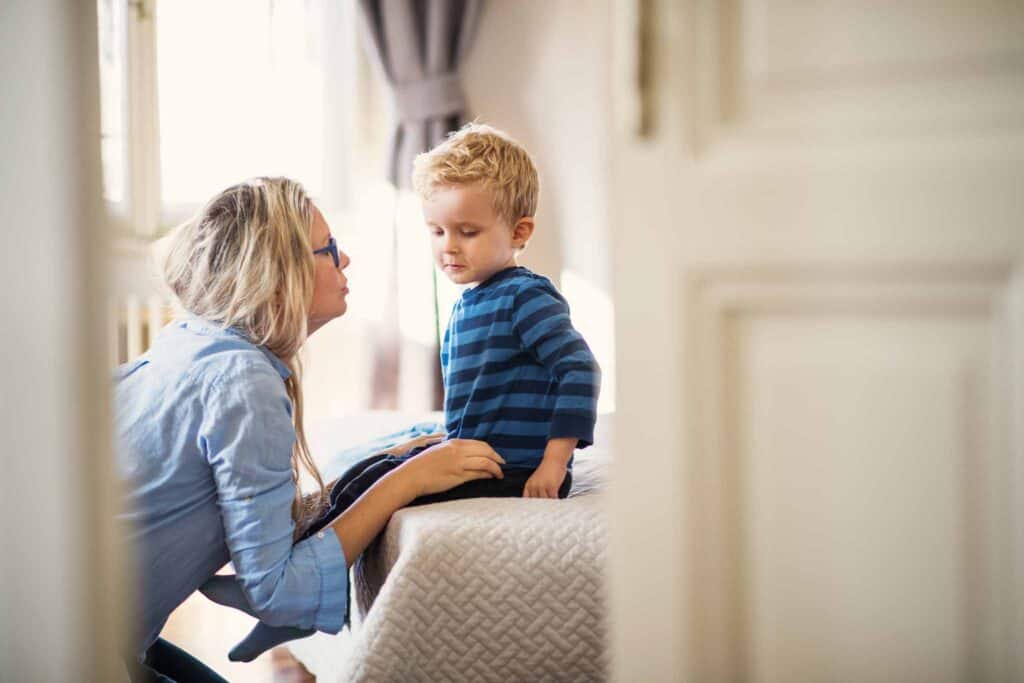Inside: Science shows that it is the repair that matters most in relationships. Four things you must do after you yell at your child and 7 things to say after you lose your temper.
As parents, we are bound to lose our cool with our kids at some point. When we lose our temper, it often has more to do with us than with them — our triggers, our inner voice, and our emotional baggage.
Research on attachment and interpersonal relationships shows that it isn’t about losing your temper that defines a relationship — it’s about the repair.
What you do after you yell is one of the most critical things you can do as a parent.

Relationship Repair is an Emotional Intelligence Skill
Researchers have long studied parent-child relationships with a laboratory procedure called the ‘strange situation.’ Generally speaking, what happens is that a parent and child are brought into a room that looks like an office waiting room with magazines and a few toys. After a few minutes, a research assistant, the “stranger,” comes into the room and speaks with the parent. Then, the “stranger” approaches the child. The parent leaves their child with the stranger and enters the next room. Then they return, and the stranger leaves.
This laboratory procedure was developed to study children’s attachment styles to their parents. Most children will cry when their parent leaves the room — regardless of their attachment style. However, what the child does when the parent returns is how they are classified.
- A securely-attached child will cry, approach the parent, receive and accept comfort, and start to play with the toys again.
- An avoidantly-attached child will avoid the parent, stop crying, look away from the parent, and fiddle with the toys, but not really play.
- An anxiously-attached child will cry even harder, refuse to be comforted, and not play with the toys.
Many parents think if their children cry that, they are insecure. That isn’t the case at all — most securely-attached children will cry. It’s the human child’s way of communicating emotions. During the reunion, their parents accept those emotions, comfort them, and they return to exploring their world.
It isn’t the separation that determines the relationship, but the reunion with the parent — the repair (source). Importantly, parents of securely attached children do not dismiss their child’s emotions or avoid them- they accept them, comfort them, and encourage exploration once their child feels better. In other words, they help their child move through the emotions.
Similarly, in research on conflict between couples, researchers have found that everyone argues, but it is the successful couples who repair (source).
Research on inter-parent conflict found that when parents argue in front of their children, there are no lasting negative effects as long as the parents often reach some kind of resolution or repair (source).
It is well-known that the ability to repair after the inevitable ruptures that happen in all kinds of human interactions is a key component of emotional and social intelligence.
One caveat to this is that harsh conflict isn’t repaired with resolution, insecurely-attached children don’t recover and explore the toys again, and harsh verbal discipline predicts negative outcomes for kids. Peaceful parenting and reducing yelling should always be a goal we have as parents — for ourselves and our kids.
What to Do After You Yell: Four Steps to Repair
You don’t have to be perfect. We’re all going to mess up at times. We’re all going to be fearful, we’re going to be grumpy. Just repair and move on.
Tina Payne Bryson, Ph.D.
1. Move Through The Guilt
If you are overcome with guilt after you yell, you won’t be able to do what you need to do to repair.
Remember that it isn’t conflict, the separation, the yelling that is the biggest determinant — it is what is done after, the repair. This parent mind-shift can help you move through very heavy and real feelings of guilt.
Let the guilt or frustration that you feel not be a way to beat yourself up or yell at yourself, but instead an alert to you that something has happened that you are uncomfortable with — let your conscious attention focus on what in the situation you are unhappy about.
Perhaps you are noticing a deep-rooted cycle, or maybe it is simply that you are tired and reacted instead of responding to your child.
2. Listen To Your Inner Voice
How your speak to your child becomes their inner voice.
Peggy O’Mara
That quote hits home, doesn’t it? Think for a minute about your inner voice. What inner voice are you passing on to your child?
You may have to stop yelling at yourself internally and tune into your feelings. Take a deep breath, and recenter.
Turn inward and think to yourself, this is not an emergency; I do not have to do anything right now. What stress or emotions are you experiencing? What triggers have surfaced, or which buttons were pushed? Be curious.
Open your heart, give space for your feelings, and attend to them. Instead of telling yourself to calm down, listen to what is actually going on. That image of a perfect, calm parent might be part of what got you here in the first place.
Listen to your inner voice and your feelings, so you can acknowledge them and work through them. Admit to yourself that you feel stressed, tired, overwhelmed, frustrated, upset, or whatever your inner reality is.
The willingness to consciously look inward leads to real change and helps you move from an angry mom or angry day to inner peace and more patience with those around you.
As you start to explore inwardly, if you do discover some triggers or unresolved feelings from your own past, this is an excellent opening for therapy or counseling. For resources in your area, look on the APA’s psychologist locator site or Psychology Today’s website.
Related: Five Steps to Calm and Centered Even When Your Child is Out of Control
Related: 10 Ways to Stop Yelling At Your Kids and Instead Coach Them Through Emotions
3. Own It and Model Self-Regulation For Your Kids
Wouldn’t it be weird if you didn’t ever lose it? That would be something to live up to as a child — perfect regulation always. Sometimes, parents make mistakes, too.
Losing it is part of it, part of life, part of relationships. Your kids should witness this, and they will. So, give yourself some grace and use it as an opportunity to model self-regulation for your kids — this is a great chance to teach your child how to repair.
Admit that you lost your temper or got frustrated. Take full ownership of your actions. Tell your child what you did to calm down and how you regained your self-control.
If your child responds with questions about how you felt, go ahead and talk with them. Talk about how feelings come and go, that even negative emotions are there for a reason, and that we need to listen to our feelings. You can also ask them if they ever have felt upset like you were.
YOU are your child’s greatest role model!
4. Apologize and Connect with Your Kids
If you want your child to be able to treat others with respect, take responsibility for their actions, and be able to genuinely apologize, you have to do that, too.
It can be uncomfortable to admit you were wrong without saying “but” and justifying your actions, especially if you weren’t apologized to as a child.
Get on your child’s level to re-establish a connection with them, look them in the eyes, ensure you have their attention, and offer them a genuine apology.
7 Things to Say to Your Child After You Yell
- Wow, I didn’t like the words I used with you right now. I am sorry.
- I was very angry, and I yelled at you. It was not okay for me to yell, even if it was okay for me to feel my feelings.
- Whoa, I really lost my temper, and I was so angry. That was not the way I hoped to start our day. I am going to have a do-over and try again.
- I got really mad, didn’t I? Sometimes parents feel angry too. I yelled at you, and I shouldn’t have done that. I’m sorry. But then, I took some deep breaths and started to feel okay again. I calmed down. I love you.
- I love you, always. There is nothing that could change my love for you. Even when I am angry, I still love you.
- I am sorry I lost my cool. I am here with you now, and I am calm. What do you need right now?
- It is okay to feel angry, but it wasn’t okay for me to yell at you. I lost my temper. I love you, and I am sorry.

 40 Science-Based Positive Affirmations to Help Kids Build Inner Strength and Buffer Stress
40 Science-Based Positive Affirmations to Help Kids Build Inner Strength and Buffer Stress